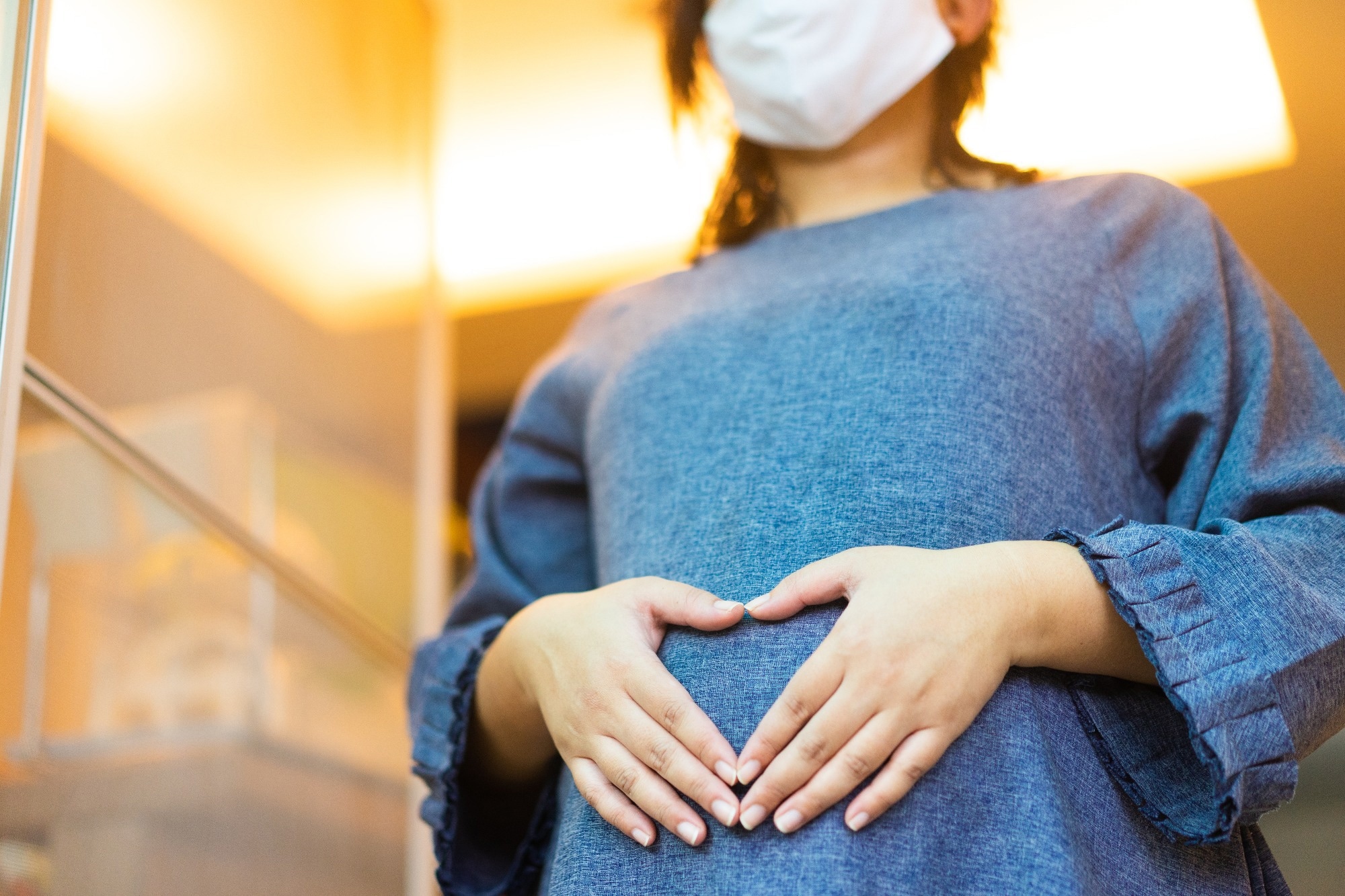A recent study published in the Cell Reports journal analyzed immune ecology at the placenta in mild or asymptomatic severe acute respiratory syndrome coronavirus 2 (SARS-CoV-2) infection during pregnancy.
 Study: Single-cell RNA sequencing reveals immunological rewiring at the maternal-fetal interface following asymptomatic/mild SARS-CoV-2 infection. Image Credit: MIA Studio / Shutterstock
Study: Single-cell RNA sequencing reveals immunological rewiring at the maternal-fetal interface following asymptomatic/mild SARS-CoV-2 infection. Image Credit: MIA Studio / Shutterstock
Background
The ongoing coronavirus disease 2019 (COVID-19) pandemic, driven by SARS-CoV-2, remains a substantial global concern. According to the overwhelming data, pregnant women appear to be a high-risk population for SARS-CoV-2 infection.
Existing reports indicate that pregnancy lowers the generation of excessive peripheral inflammatory processes to SARS-CoV-2 infection, commonly observed in non-pregnant people. During pregnancy, the immunological environment of the maternal-fetal interface, i.e., the placenta, changes dramatically. Insights on decidual adaptations to respiratory infections like COVID-19 are slowly emerging.
At the maternal-fetal interface, severe COVID-19 has been demonstrated to activate maternal inflammatory reactions. Nevertheless, little is known about immune rewiring at the placenta during mild/asymptomatic COVID-19 and how this connects with peripheral immune adaptations.
About the study
In the current study, the scientists examined the immune changes in term decidua and blood during mild/asymptomatic COVID-19 in pregnant women. They investigated the decidual and peripheral immune cells at the placenta at term after a mild/asymptomatic SARS-CoV-2 infection among mothers during late pregnancy.
The team procured blood and placenta samples from pregnant women who had mild COVID-19 or were found to be polymerase chain reaction (PCR)-positive during the compulsory testing at the delivery time despite having no symptoms of infection (asymptomatic). They profiled alterations in the immune environment of maternal decidua using single-cell ribonucleic acid (RNA) sequencing (scRNA-seq) and multicolor flow cytometry.
Collectively, using scRNA-seq and flow cytometry, the researchers determined the influence of mild/asymptomatic SARS-CoV-2 infection on the immune environment of maternal decidua and peripheral blood mononuclear cells (PBMCs).
Results and discussions
Congruent with prior findings, the authors reported higher monocyte, granulocyte, and platelet frequencies during mild/asymptomatic COVID-19 in pregnancy. Yet, they did not find observable indications of lymphopenia. As previously documented, the pregnant COVID-19 patients had a decrease in plasmacytoid dendritic cells (pDCs). Furthermore, similar to a prior study, the team found no monocyte subgroup redistribution or alterations in the cluster of differentiation 86 (CD86) and human leukocyte antigen-DR isotype (HLA-DR) surface expression.
During mild/asymptomatic COVID-19, the researchers observed a decrease in naive CD4 T cells, an increase in TEMRAs, i.e., CD8 memory T cells, and an abundance of PD1+ antiviral CD8 and cytotoxic CD4 T cells. In addition, all subjects harbored antibodies to SARS-CoV-2 nucleocapsid protein (NP) and receptor-binding domain (RBD). The investigators found widespread myeloid cell stimulation in both macrophage subgroups with mild/asymptomatic COVID-19, albeit there were differences in outcomes between the two decidual macrophage subgroups: HLA-DRhigh and HLA-DRlow, which were distal membrane arm assembly component 1 (dMac1), i.e., tissue-resident decidual macrophages, and dMac2, i.e., blood monocyte-derived decidual macrophages, respectively.
Even though mild/asymptomatic illness led to a selective loss of tissue-resident dMac1, the investigators noticed a hike in cytokine-producing macrophages, i.e., interleukin 1β+ (IL1β+). This predominance of cytokine-generating macrophages might be a reaction to systemic inflammatory signals during acute infection, considering the lack of placental infection.
Both macrophage subgroups had increased nuclear fraction κB (NF-κB), toll-like receptors (TLRs), chemokine, and cytokine signaling profiles, indicating a high activation level. Nonetheless, just dMac1 exhibited elevated expression of various heat-shock proteins (HSPA6, HSPA5, HSPE1), a possible protective mechanism against cellular stress at maternal-fetal contact.
Additionally, viral-sensing networks like retinoic acid-inducible gene I (RIG-I) signaling and interferon (IFN) receptor expression, i.e., IFNAR1, were elevated with mild/asymptomatic illness, and IFN signaling module scores in dMac2 in the decidua were attenuated. In addition, dMac2 showed a decrease in major histocompatibility complex (MHC) class II module scores and HLA-DR expression.
The scientists found a slight decrease of naive T cells and an increase in memory subsets in both decidua and blood, like PD1+ CD8 T cells. With mild/asymptomatic COVID-19, they discovered an increase in CD4+CD69+ and CD8+CD69+ tissue-resident T cells. They also discovered a reduction in Tregs across the decidua but increased HLA-DRA-expressing stimulated CD4 T cells. Furthermore, overexpression of MHC class II elements on CD8 T cells was detected only in the decidua. Besides, cytotoxic CD4 T cells expressing C-X-C chemokine receptor type 4 (CXCR-4) and high amounts of GZMA, GZMH, and chemokine C-C motif ligand 5 (CCL5) were seen only in the blood.
Apoptotic signaling traits in circulating CD4 T cells were downregulated, whereas IFNγ and tumor necrosis factor (TNF) signaling was absent in decidua. Moreover, compared to blood, T cells in decidua experience minimal clonal proliferation during asymptomatic infection, according to the T cell repertoire study.
Collectively, these findings suggest that mild/asymptomatic COVID-19 during pregnancy alters the immune ecology of the maternal-fetal junction, potentially resulting in long-term negative consequences for the child.
Conclusions
The study findings demonstrated that COVID-19, whether asymptomatic or mild, profoundly alters maternal-fetal contact. The team noticed that T regs, excited T cells, and decidual macrophages harbored altered frequencies. In decidual macrophages, type I IFN signaling and antigen presentation were reduced. Further, the heterogeneity of T cell repertoire in the decidua and circulation was diminished.
On the whole, the current work suggests that while antiviral cytotoxic reactions were likely limited to the blood, excited tissue-resident decidual T cells expand during SARS-CoV-2 infection and show evidence of increased IFN signaling in mild/asymptomatic COVID-19 during pregnancy. These T cell alterations, accompanied by the loss of regulating tissue-resident macrophages, i.e., dMac1, may shift the decidual immune cells' balance to a pro-inflammatory condition, leading to pregnancy complications.
- Sureshchandra S, Zulu M, Doratt B, Jankeel A, Tifrea D, Edwards R, et al. Single-cell RNA sequencing reveals immunological rewiring at the maternal-fetal interface following asymptomatic/mild SARS-CoV-2 infection. Cell Reports. 2022;39(11):110938, DOI: https://doi.org/10.1016/j.celrep.2022.110938, https://www.cell.com/cell-reports/fulltext/S2211-1247(22)00720-3
Posted in: Child Health News | Medical Research News | Medical Condition News | Women's Health News | Disease/Infection News
Tags: Antibodies, Antigen, Blood, CCL5, CD4, Cell, Chemokine, Coronavirus, Coronavirus Disease COVID-19, Cytokine, Cytometry, Flow Cytometry, Gene, heat, Human Leukocyte Antigen, Interferon, Interleukin, Leukocyte, Ligand, Lymphopenia, Macrophage, Membrane, Monocyte, Necrosis, Pandemic, Placenta, Platelet, Polymerase, Polymerase Chain Reaction, Pregnancy, Proliferation, Protein, Receptor, Respiratory, Retinoic Acid, Ribonucleic Acid, RNA, RNA Sequencing, SARS, SARS-CoV-2, Severe Acute Respiratory, Severe Acute Respiratory Syndrome, Stress, Syndrome, Tumor, Tumor Necrosis Factor

Written by
Shanet Susan Alex
Shanet Susan Alex, a medical writer, based in Kerala, India, is a Doctor of Pharmacy graduate from Kerala University of Health Sciences. Her academic background is in clinical pharmacy and research, and she is passionate about medical writing. Shanet has published papers in the International Journal of Medical Science and Current Research (IJMSCR), the International Journal of Pharmacy (IJP), and the International Journal of Medical Science and Applied Research (IJMSAR). Apart from work, she enjoys listening to music and watching movies.
Source: Read Full Article